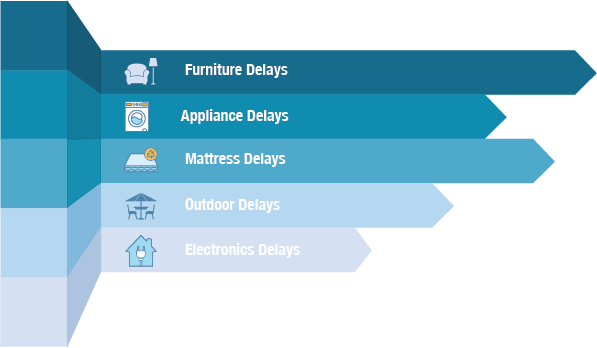Survey: Big-ticket categories like furniture and appliances also feeling pinch as Covid-19 continues to impact shipments
About one in 10 shoppers say they elected not to buy a mattress because the product they sought was not available, a new Better Sleep Council survey reveals.

Overall, consumers put the blame for product shortages and delays on the Covid-19 pandemic and related shipping bottlenecks and labor shortages — but not on manufacturers or retailers.
The survey notes that about one-third of consumers who didn’t buy a mattress did purchase another sleep product, with mattress toppers and air mattresses leading that list. But the results suggest that lack of mattress availability is having a negative effect on industry performance with potentially lost sales.
Industry observers say that any lost mattress sales would be an unwelcome development at a time when business conditions remain volatile and retailers are scrambling to keep their sales on an upward trajectory.
The BSC survey indicates that other big-ticket categories face similar issues.

“The mattress industry is not unique, as similar percentages for nonpurchase were reported in other categories like furniture and appliances,” says Mary Helen Rogers, vice president of communications and marketing for the International Sleep Products Association. The BSC is ISPA’s consumer education arm.
Rogers says the BSC commissioned the survey to gain insights into the impact that much-discussed supply chain issues are having on mattress consumers and to see how those impacts compare with those experienced in other product categories.
The online survey of about 1,000 consumers, conducted late last year, found that product availability and shipping delays are affecting attitudes and behaviors of mattress consumers —and other consumers of big-ticket categories, such as furniture, electronics, appliances, and outdoor power equipment and tools.
Among shoppers who dealt with a delay from the time of purchase to delivery, mattresses ranked as the second-most delayed big-ticket category, behind only furniture, according to the survey. About 20% of mattress purchasers said they experienced delays in getting their products — and almost half of those said companies did not inform them about the delays until after the purchase.
Some 36% of mattress purchasers who experienced a delay reported a wait of less than two weeks, while 38% said it was from two weeks to just under a month, 23% said it was from one to two months, and 3% said it was three months or more. In contrast, 35% of furniture purchasers who experienced a delay reported it was from one to two months, with 13% experiencing a wait of three months or more. Appliances were the third-most delayed big-ticket category, the survey found — 17% of those buyers who experienced a delay reporting a wait of one to two months.

Overall, among consumers who dealt with a delay in getting big-ticket items, the majority experienced waits of two weeks to under one month, and most felt the delays were somewhat reasonable, the BSC survey found.
More than 20% of consumers who elected not to buy a mattress cited either products not in stock (14%) or shipping delays (9%) as the reasons they did not make the purchase.
Mattress shoppers ranked product availability second only to price among factors influencing their purchase decisions. Delays in product availability created moderate levels of frustration among the mattress buyers surveyed.
Asked what they had purchased instead of a traditional mattress, 15% of shoppers said they bought a mattress topper, while 10% purchased an air mattress, 9% bought a sofa and 6% purchased a futon.
The BSC survey suggests that the widespread delays and shortages across the U.S. economy may be resetting consumer expectations to some extent.
Supply chain issues have hit big-ticket categories to nearly the same degree. While 11% of mattress shoppers did not make a mattress purchase because of availability issues, the percentage was 15% for furniture, 13% for outdoor equipment and tools, 12% for appliances and just 7% for electronics.




